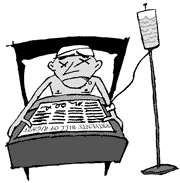LAST WEEK, the Senate began its noisy debate on two competing versions of the so-called “Patients’ Bill of Rights.”
As a result, we’re getting tons of “news” about politicians’ power struggles and intrigues and their fealties to trial lawyers, HMO lobbyists, or business leaders. Will the Democrats use this debate to define their agenda? Will George Bush ever allow HMOs to be sued? It remains to be seen. Back to you, Dan. [Vomit off-camera.]
Meanwhile, we never once hear how any of this even begins to help you and me, the customers of America’s health care system.
That system is an inefficient, costly, inaccessible, complex, bureaucratic, money-driven morass that produces spectacular cutting edge medicine and some of the worst public health indices in the Western world. Ravenous middle people—insurance companies, drug manufacturers, pricey specialists, and dubious shamans of all stripes—have inserted themselves, quite lucratively, into the healing process. Add in unnecessary tests and prescriptions and the medicalization of what used to be considered the normal vagaries of life, and the result has very little to do any longer with keeping people alive and healthy. My body is a business opportunity; your pain is their income stream. And nobody can explain why the whole mess is tied to the workplace—a setup that’s brutal for both employers and anyone who’s not a traditional employee (or married to one).
Many people get a lot of what they need this way, but some get very little, a few are actively harmed, and, especially for the cost, we could do far better. We pay more for health care per capita than any other Western country, and in many ways, get far less. We could fund universal health care—as just one example—for much less, with better results, than what we’re now spending on our inefficient system.
HMOs were a response to those ballooning costs. But they have “fixed” the problem by inserting themselves into the medical decision-making process, a step many patients are rightly unhappy with. Remember when Hillary Clinton’s “socialized medicine” (don’t even get me started) was gonna take away our choice of doctors? Har dee har har.
Hence, the Patients’ Bill of Rights. Many of the same insurance companies who created Harry and Louise are scrambling, lining up to prevent provisions that expand patients’ rights to sue HMOs. The bill also expands somewhat patients’ abilities to go to a pediatrician or OB-GYN or get emergency care without preapproval. (For some reason, women resented having to have an HMO diagnose that they were pregnant.)
PANACEA, REFORM, OR PLACEBO?
But is the Patients’ Bill of Rights panacea, reform, damage control, or placebo? It’s not as though any of us are likely to sue an HMO anytime soon—with the lawyers a big corporation can muster, and the high burden of proof, that’s a step few will ever take. What does the bill have to do with HMO patients’ ability to get good health care when they need it?
Meanwhile, what about America’s nearly 50 million uninsured? What about the tens of millions more whose insurance coverage is so parsimonious that they only seek out care for emergencies, neglecting basic preventive care that saves lives and reduces overall medical costs? What about the virtual monopolies insurance companies have in some markets, dictating how entire states practice medicine? How will this legislation reduce costs, increase access, or improve care? Nobody’s even asking because such goals seem so distant from America’s current health care reality. This bill is in the business of replacing the Titanic‘s deck chairs with recliners. The ship’s still sinking.
Suing HMOs is a nice idea, but it’s hardly a fundamental principle for fixing health care. And so, for something called a “Bill of Rights,” the American Association of Health Plans, the Association of Trial Lawyers, the U.S. Chamber of Commerce, the Health Insurance Association of America, the Business Roundtable, the American Medical Association, the Health Benefits Coalition (it’s not what it sounds like), the National Federation of Independent Business, and various other hungry piranhas anointed by the networks are all weighing in. None of them are advocating the kind of risks necessary to create a truly functional health care system. Neither are any politicians. (Remember when Jim McDermott made this his issue? You don’t? Well, it was a long time ago.)
For the wealthiest country in the history of the world to have the health care system we do is an outrage. So is big media’s willingness to believe that the anemic so-called “Patients’ Bill of Rights”— if one ever passes after further watering-down—is a triumph. It’s an embarrassment because we patients need so much and are getting so little. We need to start demanding immediate, radical changes—obviously, no one else will— because it’s not just the accountability of HMOs that’s the problem: It’s the whole structure.







